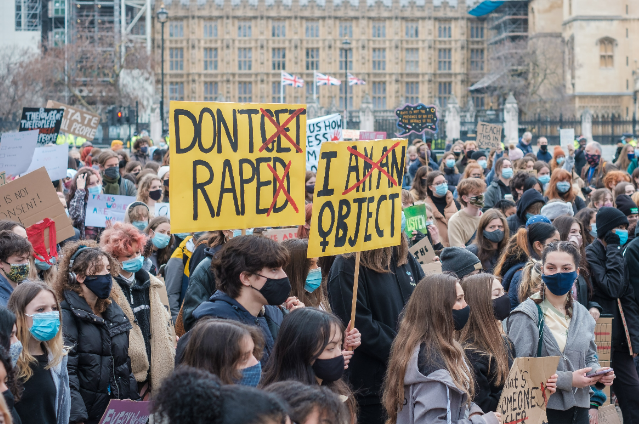
Photo by unsplash.com/@theeastlondonphotographer
When we hear the word harassment, what is the first thing that comes to our mind? Uninvited touches? Discomfort at the workplace? Not feeling safe? Prying eyes while you're walking down the streets? When you think about all these, does it make you feel angry and helpless?
Having been born and brought up with privileges that most people wish to have, it is disturbing to even imagine the horrors that some people, especially women have to go through in their daily course of life. If the above questions are any indication, sexual harassment can take place anywhere. It can happen at home, outside when you're in the streets, at the workplace, at marketplaces and malls, in person or online.
With the advancement of technology and the increasing popularity of social media sites like Instagram, Facebook and other social media platforms, the access and audacity of such perpetrators have increased tenfold. Hiding behind a mobile screen, making obscene comments and sending unsolicited vulgar pictures via messages, harassment cases on such platforms have reached an alarming rate.
As a woman, it is sad to say that I am yet to come across another woman who hasn't faced some form of harassment. At times, it is so common in certain places that people don't even realise when they are being harassed. Making inappropriate comments about the body, invading someone's personal space, and sexual gestures are some forms of sexual harassment that go unnoticed and are passed off as "making jokes" or "being friendly".
As a citizen of the world's largest democracy, it is sad to say that even now, India needs to rigorously work on the implications of Sexual Harassment Laws. Not only that, but we also need to work on opening our mindsets toward the victims, empathising with them, empowering them to speak up about struggles and focusing on helping them instead of blaming them. In several instances over the years, our judicial courts have made some questionable judgements and passed unprecedented laws and statements that not only reflect upon the poor conditions of India's judicial system but also sets a bad example for the youth of the nation.
Kerala Sessions Court made it to the news for all the wrong reasons when they made a statement saying, “If a woman is wearing a sexually provocative dress, then it is not sexual assault.” In a similar case, Justice Pushpa V. Ganediwala of Bombay High Court said that “Touching a minor girl’s breast without removing the top would not fall within the definition of sexual assault.” This approach of the Judicial System across states of India regarding sexual harassment cases is appalling and compels us to question our faith in the justice system.
Adding to that, there is no real law or act protecting men against these horrible acts in the Constitution. Sexual Harassment and assault can happen to anyone no matter the age, gender or orientation. Men and boys go through the same feelings and struggle as any other victims but on top of that, they may face some additional challenges because of social attitudes and stereotypes about men and masculinity. The overwhelming sense of not being “man” enough to stop the assault and worries about disclosing due to the fear of judgement induces anxiety and depression among them.
Sexual harassment/assault is not just about one single incident or a series of prolonged abuse, it is also about the trauma that follows the person even as they try to move on with their life post the occurrence of harassment. Sexual abuse consciously or subconsciously affects the way they conduct themselves, act around other people, react to physical touch or just trust people. It’s a chip that makes them look over their shoulders every time they come across people. Post-trauma stress can last for a long period of time. Along with that, anxiety and depression, post-abuse are also serious conditions that victims may experience.
There is a lot that needs to be done in order to combat this evil. Merely passing laws is not going to help if they aren’t being implicated properly. A lot of children aren’t even aware of the concept of “good touch” and “bad touch”, therefore they don’t report it, or in a lot of cases, the family members forbid the victim from talking about it due to family honour and shame. Education is the first and foremost step towards battling sexual harassment as the more people are cognizant of the rights that protect them against sexual harassment, the more they can take action against it.
Listening to the survivors talk about their struggles can help create a more safe environment for them to open up and take a stand against Sexual Abuse. They will feel a sense of being understood and that their problems are being taken seriously. Just showing them they matter by giving our undivided attention can ease them into the process of healing. Validating their feelings and expressing genuine concern lets them know that you’re there as a support system and that they won’t have to go through it alone. Providing them with appropriate resources can also prove to be very helpful. It is important to have discussions about such important topics that a lot of people go through but don’t talk about out of fear or any other circumstances. Talking about it, in a way, takes back the power from the trauma, and gives a sense of control over one’s own life which acts as a catalyst in the process of moving on with your life.
